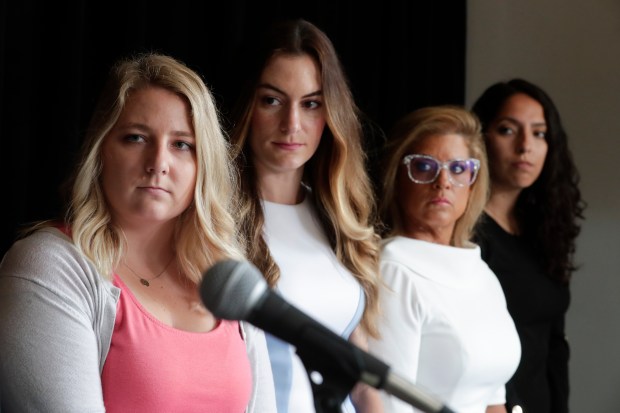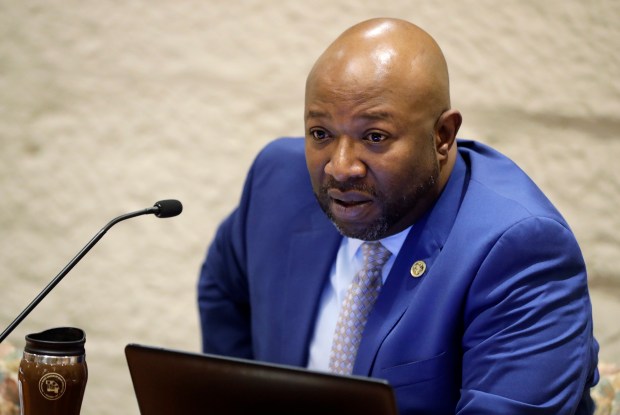Former State Senator Karen Tallian, who served in the legislature for 16 years, said the news about sexual harassment allegations against State Senator Greg Taylor wasn’t a surprise to her.
“Anything that was in the paper was not news to me, and that’s all I’m going to say about that,” said Tallian, of Ogden Dunes.
Former State Rep. Mara Candelaria Reardon, who is one of four women suing former Indiana Attorney General Curtis Hill for battery, said she was “extremely disappointed” when she read the news about the allegations against Taylor.
Former State Sen. Karen Tallian attends a pro-abortion rights rally at the statehouse in Indianapolis on Monday, July 25, 2022. (Michael Gard / Post-Tribune)
“Nothing has changed, even after we came forward,” said Reardon, who is from Munster. “I was very disappointed that nothing substantive has ever changed to create a safe space at the statehouse.”
Reardon, who left state politics, said sexual harassment in the statehouse has led to “a talent drain” for Indiana “when talented, bright, amazing women have to leave government — and sometimes the state — because of this abuse.”
Three women accusing Taylor, D-Indianapolis, of sexual harassment since he was elected in 2008, according to an Indianapolis Star story published Nov. 18.

In this Tuesday, June 18, 2019 file photo, Gabrielle McLemore, left, Niki DaSilva left center, then-State Rep. Mara Candelaria Reardon, right center, and Samantha Lozano listen as their attorney announces a lawsuit against Indiana Attorney General Curtis Hill, who accused the attorney general of drunkenly groping them at a party. (AP Photo/Michael Conroy, File)
According to the Star, the accusations span eight years and involve two instances of unwanted physical contact and a sustained romantic pursuit of an intern.
Legislative leaders were aware of at least one of the allegations, which was formally reported, but it wasn’t released to the public when Taylor was voted Senate Minority Leader in 2020, according to the Indianapolis Star.
A few hours after the article was published, the Senate Democratic caucus met to elect its leadership team for the 2025 legislative session and reelected Taylor as leader. Senator Andrea Hunley, D-Indianapolis, was elected as assistant minority leader and Senator Rodney Pol, D-Chesterton, was elected as caucus chair, according to a press release.

Sen. Greg Taylor, D-Indianapolis, speaks during a committee hearing at the Statehouse, Wednesday, Jan. 23, 2019, Indianapolis. (AP Photo/Darron Cummings)
Pol previously said his vote, which occurs under secret ballot, was for Hunley to be the leader. He joined Hunley as well as senators J.D. Ford, D-Indianapolis, and Shelli Yoder, D-Bloomington, as the four senators who voted for Hunley.
The caucus, which has 10 members, voted 6-4 to elect Taylor, Pol said.
State Sen. David Niezgodski, D-South Bend, has faced allegations of sending unwanted texts and voicemails to an employee of his plumbing business, as well as making inappropriate comments about her body and even showing up at her home, according to a Star report in April. He paid an $8,000 settlement to the victim after she filed a complaint with the Indiana Civil Rights Commission. Niezgodski voted to retain Taylor.
Tallian said the allegations against Taylor prove the culture of sexual harassment at the statehouse “is still there,” though some improvements have been made in the wake of allegations against Hill.
“I can’t say that it’s all fixed,” Tallian said.
Four women, including Reardon, accused Hill of inappropriately touching them while celebrating the end of the 2018 legislative session at AJ’s Lounge, an Indianapolis bar. After news broke about Hill, Tallian said the legislature decided to appoint one woman from each caucus — a Democrat and a Republican from the House and Senate — to create a written policy for sexual harassment.
Tallian said she was the Democrat woman appointed to help create the policy. They spent a lot of time creating the policy, but they couldn’t reach an agreement on how to discipline an elected official accused of sexual harassment, she said.
“No one person can say, ‘alright, you’re fired.’ It’s not like that. These people have been elected,” Tallian said.
Tallian said legislators need to do something to make staffers and fellow elected officials comfortable to report sexual harassment allegations. Reardon said she agreed.
Current legislators should work toward implementing some workforce changes, Reardon said, which include an independent human resources structures, clear and independent reporting paths and preemptive training and resources.
The legislature needs to allow for immediate investigations into any sexual harassment or abuse and consequences for the accused “especially when they admit that they’ve done wrong,” Reardon said.
“Democrats and Republicans both have to take a hard look at their behavior. We cannot be known at the statehouse for an abusive workplace. We should be known as policymakers, who change people’s lives for the better,” Reardon said.
The National Women’s Defense League conducted a study of all statehouses in the country and found at least 359 incidents of sexual harassment committed by 130 state lawmakers since 2013, according to a November 2023 report.
“No state has created a holistic, equitable and effective system that meaningfully prevents abuse from happening, protects and supports survivors of abuse, rectifies the offenders’ behavior expediently or holds violators accountable consistently,” according to the report.
The report, which was created after researchers analyzed media reports and other public records, found that of those targeted, 45% were statehouse employees — 11% of whom were interns — 17% were lobbyists, 13% were fellow lawmakers and 3% were journalists, according to the report. The remaining 22% of survivors were put in an “other” category, according to the report.
Of the 130 lawmakers identified, 54% were Republican and 46% were Democrats, according to the report. When considering gender, 96% were men and 4% were women, according to the report.
While only 68% of legislators were men, 96% of the accused were men, “making it a disproportionately male problem,” according to the report.
Reardon said sexual harassment has been disproportionately “a man problem” that disproportionately affects women.
“Men have to figure out how to evolve and work with women and not lure their power over them,” Reardon said. “It becomes a woman’s problem created by men.”
State legislators create their own workplace policies and enforce those policies, which means the public rarely hears about instances of sexual harassment and what was done to address the situation, according to the report.
The report found that in 55% of the incidents identified, legislatures decided not to take action against the accused lawmaker. Another 32% of the officials identified were censured in some form, like losing a position of leadership, according to the report.
In the remaining instances, 9% of lawmakers were cleared of wrongdoing and 4% of lawmakers were expelled, according to the report.
But, of lawmakers accused of sexual harassment, 88% won reelection and 12% lost reelection, according to the report.
Moving forward, states should make more effort to combat sexual harassment as well as become more transparent about sexual harassment, according to the report.
“After looking at most publicly available data, it is clear that these incidents are not simply ‘one offs’ or a single ‘bad apple’ but rather indicative of structural failure,” according to the report. “If we fail to acknowledge the lack of policies and protections currently in place, the scourge of sexual harassment will continue, limiting the professional opportunities of workers.”
akukulka@post-trib.com




